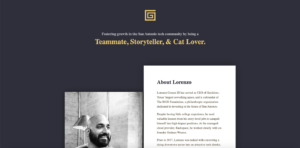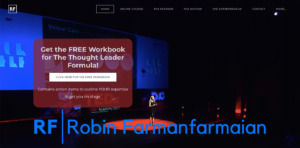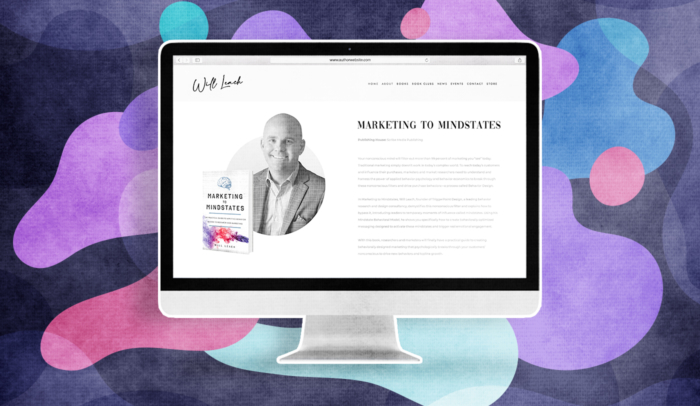Many Authors need a website.
Websites are important for Authors that don’t just want a book. Authors that want what a book gets them need a website. For example, if an Author wants their book to raise their profile, increase their authority, gain clients, book speaking engagements, or leave a legacy, then websites can be very important to achieving those goals.
This is for the obvious reason: a well-designed website builds credibility, raises visibility, and offers cost-effective marketing opportunities, especially in specific industries.
That makes a website an important Author tool for building a brand.
Thankfully, it’s also one of the easiest to create.
In this post, I will walk you through how to decide if you need an Author website, how to build one, and what your website should include. We also offer several examples of successful Author sites.
Why You (Might) Need an Author Website
An Author isn’t the same thing as a writer.
Writers make money by selling copies of their books. That is their primary job.
An Author writes books as a way to promote something else—usually the knowledge or expertise of the Author themselves. Authors help people solve their problems, and as a result, they raise their own profile.
Are you having trouble eating right? Here’s what to do.
Are your children misbehaving? Here’s the solution.
Is your company experiencing growing pains? Try these four things.
Before they can do that, though, they have to convince readers that they’re the perfect person to help. That’s the role of an Author brand. Your brand tells potential readers why they should pick up your book, instead of someone else’s.
For some Authors, a strong website is an essential part of their brand. For others, a website is unnecessary.
In fact, I would go so far as to say most Authors don’t need one.
Here’s a simple questionnaire to help you figure out which camp you fall into:
- Are you a professional writer?
- Do you want to do a lot of speaking?
- Do you want to build a personal or professional brand platform? (In other words, are you trying to build a brand around yourself instead of around a product, service, or idea?)
- Will people expect you to have a distinct Author website?
If you answered “yes” to any of these questions, then having an Author website is probably a good idea. It will help you build and promote your brand as a writer, speaker, or public figure.
If you answered “no” to all of them, then you probably don’t need one.
For many of our Authors at Scribe, having a distinct website isn’t really worth it. They’ll be able to achieve their goals by using their personal networks, word of mouth, and referrals.
Instead of an Author website, it’s better for these Authors to have a really good LinkedIn page and a solid social media presence.
Here’s another way to think about it: who is your target audience? If it’s a large group of strangers who won’t know anything about you when they Google your name, a website might help.
But most successful Authors aren’t writing for a broad group of strangers. They’re writing for a “microtribe.” That’s the small, hardcore group of people who will champion a book and spread it to everyone they know.
Generally speaking, the wider your audience, the less likely it is that your message will resonate. When a book does happen to hit the mainstream, it’s usually only after it’s been wildly successful with a microtribe.
You won’t find your microtribe by building a website. Chances are, you already know who your tribe is.
Key Components of the Best Author Websites
Before you jump in and start building a site, make sure you understand your Author brand.
Your website should be consistent with your book’s message, target audience, and personality.
If you wrote a book about coping with a loved one’s death, your website shouldn’t be cheery and playful.
If your message is about anger management, your website shouldn’t have an aggressive tone.
You have to figure out your Author brand before you can move forward.
Once that’s settled, start gathering these key components, based on your brand.
Domain Name
If you have an unusual name, you might be lucky enough to get a website at yourname.com.
If you have a common name like John Smith, it’s more likely that .com domain will be taken.
You have a few options if your name is unavailable. All of them have pros and cons.
- Use a different domain suffix, like .net or .us. On the plus side, you’ll get the name you want. On the negative side, .com is still ingrained in people’s minds as the go-to website suffix. If you’re at johnsmith.net, they may have a harder time finding you.
- Add a descriptive word to the end of your name, like johnsmithauthor.com or johnsmithbooks.com. This will ensure readers are getting the John Smith they want, not some other John Smith who runs a bakery. It’s not exactly the catchiest domain name, though.
- Use the title of your book. Assuming you came up with a memorable title, this could be a great option. But if you plan to write other books in the future, it could have a limited lifespan.
- Piggyback on your larger brand. If your book is part of a larger brand, you might want to use that brand identity. For example, if you run a consulting firm, and the book is a way to attract clients, it might make sense to attach the book’s site to your company’s domain. The downside is that the book could get lost among all the other content.
Whatever you do, make sure your domain name is short, memorable, and unique.
Avoid numbers and hyphens. They make it harder for readers to find your site. No one wants to visit www.john-smith-1984.com.
Finally, a word of warning for people with unusual names: there’s a fine line between standing out and being difficult to locate. If your name is impossible to spell, consider choosing a domain that is simple to remember.
Just because your name is available, it might not be the best option. Think about what will be easiest for people to use.
Author Bio
Unless you’re already famous, most book buyers won’t know who you are. The point of an Author bio is to tell them.
This bio is usually one of the first things that comes up in a Google search of your name. Your bio has an impact on your sales and marketing, so you want it to be on-brand.
If people see you as an authority, they are much more likely to buy your book.
A solid bio includes your credentials and achievements, including your book title.
It should be around 150 words, and it should be interesting. Don’t ramble.
Write in third person.
Include only relevant information. If your book is about property law, don’t include your competitive surfing awards.
Put yourself in a reader’s position. Would your bio convince them that you can solve their problem?
If you need more advice, here are more of my Author bio rules.
Author Photo
Whether you like it or not, people will judge you by your Author photo.
Does your headshot look professional? Silly? Warm? No-nonsense?
What signals do you want to send your readers? What message are you trying to convey?

Your photo is a significant part of your brand. Make sure they match. Don’t include a candid photo with your dog if you’re positioning yourself as a global expert in business culture.
Every photo you use should have a high resolution. Blurry or pixelated photos will lower your credibility.
Your Book Info
Your book should have its own page.
Include a picture of your book’s cover. Images are powerful sales tools, and if your cover is well designed, they will want to buy your book.
Also, include your book description here. That’s your pitch for potential readers. It’s one of the most important factors for people deciding whether they should buy your book.
A good book description should have a compelling hook, a description of the reader’s problems, an explanation of how your book can help, and some kind of social proof that shows them you’re the guide they want for their journey.
The website version of your description should include relevant keywords to improve your SEO, or search engine optimization. Think about what potential readers might Google that would make your book turn up, and optimize for those terms as much as possible.
Your book page should also include positive book reviews, blurbs, or testimonials. These go a long way to establishing your credibility as an Author.
Your website is also a great place to sell books. That doesn’t mean you have to offer direct book sales from the website. But you should link to several major retailers, including Amazon.
Contact Info (Including Social Media Links)
One of the most important elements of an Author website is your contact information. Your book is a tool that you can use to raise your visibility, get new clients, or book speaking engagements.
Without contact information, media representatives and potential business partners won’t know how to reach you.
The most salient piece of information is your email address. If you don’t want to include your personal contact information, consider creating a contact form that can be forwarded to your inbox.
Be sure to link to all your social media accounts. You don’t have to be active on every form of social media, but you should be consistently active on at least one.
It’s also a good idea to link to your Goodreads Author page or your Amazon Author Central page.
If it’s possible, try to match your domain name and social media handles. A consistent online presence makes it easier for readers to find you. It also helps unify your brand.
Media Page
If you or your book have appeared in the media, you may want to create a media page. This is where any interviews, podcasts, magazine articles, or other media appearances would go.
When you’re looking for speaking engagements, video links can provide concrete evidence of your skills.
Having a strong book doesn’t necessarily make you a strong speaker. You are much more likely to earn bookings if people can see sample talks.
A word to the wise—if you don’t have a strong media presence, it’s better to skip this section. An unimpressive or skimpy media page will kill your credibility faster than a missing one.
Mailing List Signup
An email newsletter is another optional website element. Sending a monthly or bi-monthly email can be a great way to stay in touch with your clients, readers, and fans.
However, you should only create a newsletter if you will actually use it and have interesting content to share. A half-hearted or irregular newsletter is counterproductive. It will reflect poorly on you.
Blog
If you already have a blog, it should be part of your Author website.
Blogging is a good way to engage with readers beyond the pages of your book.
A blog can generate new traffic. It’s also a place for you to expand on ideas in your book and if readers want to learn more, entice them to buy it.
If blogging is not already part of your Author platform, think long and hard before you add one to your site. Don’t start blogging unless you are willing to commit. It looks unprofessional if your blog only has a handful of posts or if the last one was written in 2017.
Either do it or don’t.
How Do I Build an Author Website?
If you’ve never built a website, it might seem daunting. Thankfully, there are plenty of DIY design sites that offer website templates. Here are our thoughts on some of the most popular ones.
WordPress was one of the first companies to offer plug-and-play site templates. We don’t recommend it, though, because the learning curve is steep. To design an effective site, you will still need some coding knowledge. It’s a useful platform for developers, but if you don’t have any design experience, it will be difficult.
Squarespace, on the other hand, is the most user-friendly. The downside is that there are so many sites using their templates, it’s hard to make a site that stands out unless you know how to code. Squarespace’s templates are also hard to customize, so you’re trading flexibility for ease.
Our top recommendation is Webflow. It’s a flexible CMS (content management system) that doesn’t constrain you to templates. You can create unique, responsive web designs without spending hours learning code. That means there’s much more customizability than Squarespace, but it’s still easy for first-time designers to use.
Note that even a template-based DIY site can take a long time to build. Have patience and pay attention to detail. Remember, you want the site to look as professional as your published book.
If you have the resources, it may very well be worth the investment to hire a website developer.
Before you do, ask to see samples of their work.
Does their portfolio match that of your Author brand? Have they built sites for other Authors? Do they understand the specifics of book marketing?
Our Favorite Author Website Examples
1. Joey Coleman

When you visit the website of Scribe Author Joey Coleman, you immediately know that you’re dealing with an experienced and knowledgeable speaker.
The layout is simple. The font is clean and modern. The colors are bold but not too playful or bright. The entire design speaks to Joey’s Author brand.
It’s no accident that Joey knows how to appeal to an audience. After all, his bestseller Never Lose a Customer Again is all about building long-term loyalty.
Notice that Joey’s site isn’t all about his book. It’s about him. It’s about his message. There are navigation links for his book and blog, as well as for his work as a speaker, consultant, and coach.
This is an important lesson: your book is a marketing tool, not the thing you market.
Joey’s website keeps his brand, not his book, at the center of the marketing. A book is just one piece of being an Author.
2. Lorenzo Gomez III

Lorenzo Gomez worked his way from an entry-level job in a grocery store stockroom to becoming a CEO and founder in the tech industry.
His website isn’t flashy, but it’s clear, clean, and comprehensive.
The site includes a bio, his professional initiatives, a speaker contact link, and information about Lorenzo’s book Cilantro Diaries. That’s it.
It’s a great example of a minimalist website. It includes all the essential information without going overboard. It perfectly fits Lorenzo’s brand.
It’s more important for your website to look professional and be on-brand than to have a lot of content.
3. Robin Farmanfarmaian

The first thing you’ll see on Robin Farmanfarmaian’s home page (aside from a picture of her TED talk) is a mailing list signup.
It’s not your average, boring “add your email” link. Robin offers people who sign up a free workbook for her online course, “The Thought Leader Formula.”
This is a good way to convince people to register for her mailing list.
It also generates new interest in her work. If fans like the workbook, they will probably come back to the site and enlist in Robin’s course or order her book The Patient as CEO.
Robin also made a clever choice with her domain name. Farmanfarmaian is not the easiest last name for people to remember, so she used www.robinff.com instead.
You can find more examples of great Author branding and sample websites by checking out our Scribe Author Success Stories.


